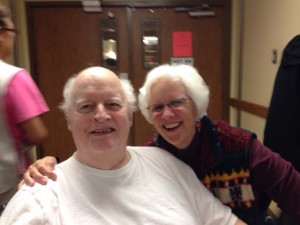Imagine hearing a knock on your door, looking through the peephole, and seeing police on the other side. I bet your heart rate would quicken. What if they have come to report a lost loved one? Perhaps there’s been a crime in your neighborhood and they need to ask you a few questions. Few of us would worry about a house search for Christian literature that would lead to an arrest—unless you lived in Russia.
Today I continue my series on Dad’s spiritual legacy, which includes a lifelong ministry to the persecuted Russian saints. I honor him by sharing three more prayer requests from his Intercessory Agreement,¹ all related to his Russian ministry.
#3 – Giving the Russian saints and inquirers plenty of Bibles and related literature without fear of confiscation.
I wish I knew how Dad became burdened for the persecuted Russian believers. I’m guessing he became involved through mission work at his church. He started a letter-writing ministry to partner with a fledgling Russian church that needed prayer support, encouragement, Christian literature, and Bibles. Through mutual correspondence, he learned that a Russian Christian church living in a Communist State had to register with the government. In other words, churches were property of the State. The government knew all their activities, the content of their sermons, and the identities of their members. Russian believers who didn’t want to register with their government formed underground churches.
My father learned about Lydia S. through his correspondence. Lydia was a hospital nurse who became a Christian at age twenty-one. She was married with three children and belonged to an underground church that secretly met in members’ homes. Lydia yearned to emigrate to the United States. To prepare for an eventual move, she taught herself English by comparing a Russian Bible with one given to her by an American.
Bibles were hard to come by in Russia. Dad prayerfully determined that he should supply them to his sister church. I’m not talking about regular UPS shipments to Russia. Dad decided in the early 1970s to hand-deliver Bibles by smuggling them into Russia, where he would meet Lydia and her family. He knew the potential dangers of the trip, but his prayer team covered him every step of the way. Dad was particularly concerned about going through customs, but by God’s hand, the authorities never opened his luggage. While in Moscow, he found families who gladly opened their homes to him. Dad’s goal was to remain incognito and minister to the underground church where Lydia worshiped.
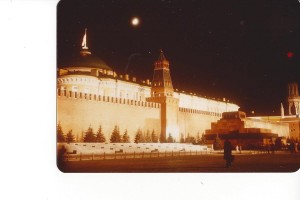
The Red Square at Night
When Dad returned home, he decided he wanted to have stronger communications with this sister church, so he learned the Russian language. Imagine a fifty-year-old high school teacher learning Russian as a second language in the evenings. He cared about these Russian saints. He mastered their language well enough that he was certified to teach it at the high school level. Here was his first class of five students:
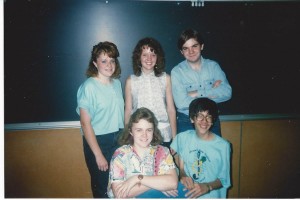
1988, Dad’s First Year Russian Students
Dad had another prayer request in his Intercessory Agreement related to his Russian ministry:
#4 – The prevention of any further arrests or confinements of Christians in the USSR and the provision of freedom to meet and worship without disturbances.
As Lydia grew spiritually, so did her conviction to speak out about the government’s unwillingness to let Christian families leave the country. She became known as a “Christian activist,” a “Soviet Dissident,” and a “Refusenik.” “Refuseniks” were people who had applied for an emigration, but had been refused by the government. In fact, she became known as the boldest, most persistent religious dissident in the Soviet Union. She was a member of a Pentecostal sect that was outlawed in the Soviet Union because its members refused to register their churches with the government. She paid a price for being outspoken.
In March of 1981, when she was thirty-seven years old, she and ten other Pentecostal women staged a brief demonstration for the freedom to emigrate. They gathered in the corner courtyard of the Lenin Library across the street from the Supreme Soviet, the nation’s parliament. She held up signs with slogans like “Give us Freedom,” or “Let us out of the USSR.” The KGB broke up the rally and dragged her away while she shouted, “Let me emigrate!” Since this was the first time she had ever participated in publicizing her plight, they released her. However, her name became known among the authorities, who watched her closely.
One night Lydia heard a knock on her door. The KGB stood before her and told her that they were performing a house search. They spent eight hours in her apartment searching for Bibles and anything religious, including a Billy Graham book, Peace with God, which had been translated into Russian. Once they were done, her telephone was yanked from the wall and disconnected. Her family endured these daylong searches twice, scaring her three children. They wanted to arrest her, but when the KGB called their superiors, they were told to “leave her alone for a while.” Dad knew all about these incidents because he was integrally involved in helping Lydia’s church.
This led to one more prayer request found in his Intercessory Agreement:
#5 – The release of all Russian saints from prisons and camps.
In 1984 there were over 1,500 unregistered Protestant congregations meeting in members’ homes. They kept their membership at forty or less to deflect notice from the government. Soviet law required registration of any religious group of twenty or more who met at a specified worship place. Anyone who was caught faced the possibility of imprisonment. It broke Dad’s heart when he learned from Lydia that many brothers and sisters in Christ remained in prison or camps where they were treated as criminals.
After four years of requesting a visa to emigrate to the U.S. and being denied, Lydia tried to resign her Soviet citizenship by sending in her “internal passport.” The internal passport is the primary identity document for any Russian citizen fourteen years of age or older. The KGB took notice and summoned her to their headquarters. She knew that this could be the last time she ever saw her family. She packed her bags, and her family prayed over her as she left her home. When she arrived, she received a “warning sermon” and was sent back home.
Lydia still wanted to emigrate. Dad, along with many other Christians associated with the underground church, continued to pray that Lydia and her family would be allowed to come to the United States. When Dad learned that her chance increased if she had relatives here, Dad adopted her! Now Lydia had a connection to the United States. She made another request to emigrate, and they finally let her leave. From the Soviet Union’s vantage point, by allowing Lydia to leave, they were depriving Moscow’s unregistered Pentecostal Church of one of its strongest leaders. I gained a Russian sister! She moved to Austin in November of 1985 with her family and lived with my Dad and brother for six months before they found their own apartment. Lydia’s family eventually moved to Massachusetts. Once they left, we lost contact with her.
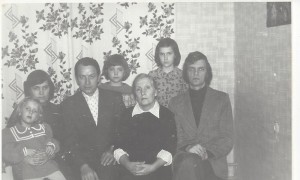
Lydia, second on left, with husband, kids, and mother
As I reflect on Dad’s ministry to the persecuted Russian saints, I take away this key principle from Dad’s legacy: If we’re going to be involved in any ministry, BE ALL IN. Dad’s heart was in it from the beginning. His ministry began through letter writing and getting to know his brothers and sisters in the Pentecostal church. As his love for them grew, his level of involvement grew. He went from praying for more Bibles to delivering them himself. As the years went by, he wanted to be more effective in his communication with them, so he learned the Russian language. Finally, to help a woman who risked her life by criticizing her government, he adopted her to give her and her family a home to come to in the United States. He was loved not only by Lydia, but multiple Russian families he discipled.
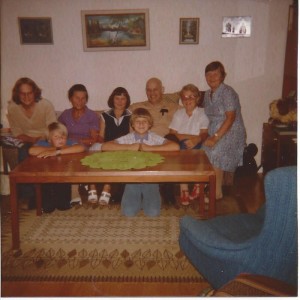
Dad with Lydia and other Russian Christians
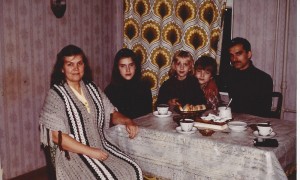
Lydia with her kids and friend
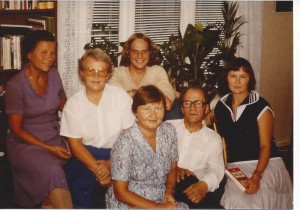
Lydia, far right, with other Russian friends
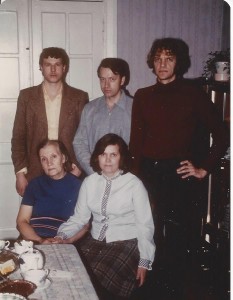
Lydia with Mother, husband in middle, and friends
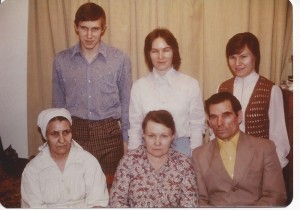
Another Russian Family
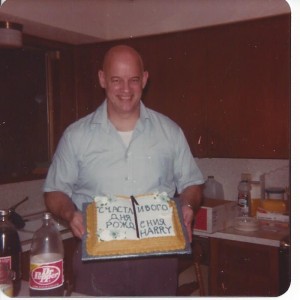
Dad’s Birthday Celebrated by Russian Saints April 30, 1981
Today I offer a reflection question. As you consider the ministries you’re involved in, are you “all in?” If not, what could you do to step up and commit? If you’d like to share your thoughts, please comment below.
Blessings,
Lee Ann
¹ Dad’s Intercessory Agreement contained this language: In the hope that it is meaningful and that my earthly life is still at least partly mine to give, I am willing to lay down the rest of my earthly life if You count that of sufficient value that You are willing in exchange to do the things I have listed below:”
¹ Prayer Request #1: The salvation of my children, Gene and Lee Ann. http://wp.me/p3LmrK-ry
¹ Prayer Request #2: The salvation of every soul I have ever asked You for or will ever ask for in prayer. http://wp.me/p3LmrK-rN
Other Resources:
Utica NY Daily Press, 1986-1763, 3-8-1986
Gettysburg Times, 12-21-1984
http://upi.com/4758152
The Ukranian Weekly 1981-12
The Ukranian Weekly 1982-31
The Miami News, 3-8-1986
The Miami Herald, 7-7-1984
The Austin American Statesman, 5-29-1986
